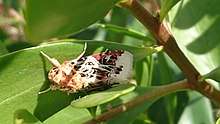Spodoptera picta
Spodoptera picta, the lily caterpillar, is a moth of the family Noctuidae. It was described by Félix Édouard Guérin-Méneville in 1838. It is found in India, Sri Lanka, Australia and Japan.
| Lily caterpillar | |
|---|---|
 | |
| Adult moth | |
| Scientific classification | |
| Kingdom: | Animalia |
| Phylum: | Arthropoda |
| Class: | Insecta |
| Order: | Lepidoptera |
| Superfamily: | Noctuoidea |
| Family: | Noctuidae |
| Genus: | Spodoptera |
| Species: | S. picta |
| Binomial name | |
| Spodoptera picta (Guérin-Méneville, 1838) | |
| Synonyms | |
| |
Description
The wingspan is about 40 mm. It is generally an ochreous-white moth. The head and thorax are suffused with pinkish red. The forewings have some red on their costal base. There are numerous ill-defined waved black lines present between the base and antemedial line. Orbicular and claviform consisting black rings. A medial pinkish red band, wide at costa narrowing to inner margin. The reniform with ochreous and black outlines and red center. The postmedial double waved lines are filled in with ochreous and highly excurved beyond the cell. Some black dashes can be seen on reddish patches beyond it. Hindwings semi-hyaline white.[1]
Caterpillars have smooth skin and are pale grey with a series of longitudinal black lines. Mesothorax also has dark patches with last abdominal segment. With development, central dorsal line become yellowish.[2]
Ecology
.jpg)
The larvae feed on Crinum asiaticum, Crinum pedonculatum,[3] Clivea miniata, Hymenocallis littoralis, and Hippeastrum species. They bore into the leaves and down into the crown of the bulb.[4] Eggs are laid on lily plants. The caterpillar pupates in leaf litter.[5] Pupation takes place under ground in an earthen cocoon.[6]
References
- Hampson, G. F. (1894). The Fauna of British India, Including Ceylon and Burma: Moths Volume II. Taylor and Francis – via Biodiversity Heritage Library.
- Herbison-Evans, Don & Crossley, Stella (24 April 2017). "Spodoptera picta (Guerin-Meneville, [1831])". Australian Caterpillars and their Butterflies and Moths. Retrieved 17 August 2018.
- Savela, Markku. "Spodoptera picta (Guérin-Méneville, [1838])". Lepidoptera and Some Other Life Forms. Retrieved 17 August 2018.
- "Lily Caterpillar Moth - Spodoptera picta". Brisbane Insects. Retrieved 3 August 2016.
- "Lily Caterpillar Facts". Australian Wildlife. Retrieved 3 August 2016.
- Holloway, Jeremy Daniel. "Spodoptera picta Guerin-Meneville". The Moths of Borneo. Retrieved January 22, 2019.
External links
- Calogramma picta image at Le Monde des insectes
- "Late Instar Caterpillar and Metamorphosis of Spodoptera picta Guérin-Méneville (Lepidoptera: Noctuidae: Noctuinae) With Notes On Its Cannibalistic Behaviour". Archived from the original October 3, 2016.